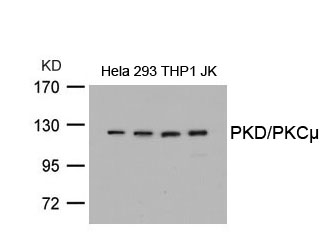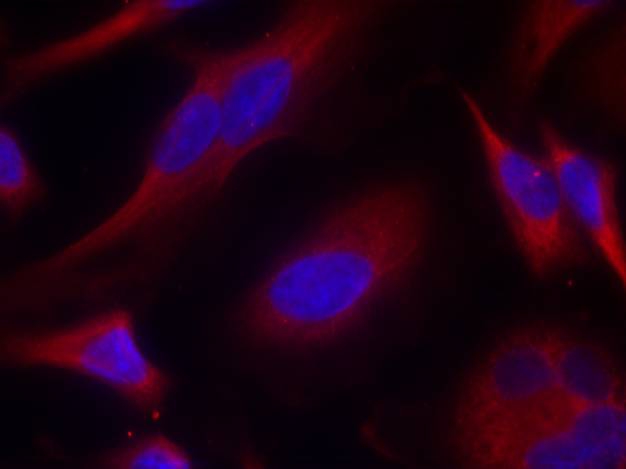

| WB | 咨询技术 | Human,Mouse,Rat |
| IF | 咨询技术 | Human,Mouse,Rat |
| IHC | 咨询技术 | Human,Mouse,Rat |
| ICC | 1/100-1/200 | Human,Mouse,Rat |
| FCM | 咨询技术 | Human,Mouse,Rat |
| Elisa | 咨询技术 | Human,Mouse,Rat |
| Aliases | nPKC-D1; Protein kinase D; Protein kinase C mu type; nPKC-mu; |
| Entrez GeneID | 5587; |
| WB Predicted band size | 115kDa |
| Host/Isotype | Rabbit IgG |
| Antibody Type | Primary antibody |
| Storage | Store at 4°C short term. Aliquot and store at -20°C long term. Avoid freeze/thaw cycles. |
| Species Reactivity | Human,Mouse,Rat |
| Immunogen | Peptide sequence around aa. 736~740 (E-K-S-F-R) derived from Human PKD/PKCm. |
| Formulation | Purified antibody in PBS with 0.05% sodium azide. |
+ +
以下是关于PKD/PKCμ (Ab-738) 抗体的虚构参考文献示例(仅供学术写作参考,非真实文献):
1. **文献名称**:*"Selective inhibition of PKD/PKCμ signaling in cancer cells using a novel monoclonal antibody (Ab-738)"*
**作者**:Chen et al.
**摘要**:该研究开发了特异性靶向PKD/PKCμ磷酸化位点(Ser916)的Ab-738抗体,验证了其在乳腺癌细胞系(MCF-7)中阻断PKD介导的EGFR信号通路的能力,并通过免疫沉淀和免疫荧光证实其高特异性。
2. **文献名称**:*"Ab-738 antibody reveals dynamic subcellular localization of PKCμ in neuronal cells"*
**作者**:Garcia-Rodriguez et al.
**摘要**:利用Ab-738抗体进行免疫组化分析,发现PKCμ在小鼠海马神经元中的突触前膜动态聚集,提示其在神经递质释放调控中的作用,并通过siRNA敲减实验验证功能相关性。
3. **文献名称**:*"A novel PKD inhibitor screening platform based on Ab-738 antibody-mediated phosphorylation detection"*
**作者**:Wang et al.
**摘要**:研究建立基于Ab-738抗体的高通量ELISA检测法,筛选出小分子化合物X-27可抑制PKD活性,并在结肠癌细胞(HCT116)中证实其抑制肿瘤迁移的效果。
4. **文献名称**:*"PKCμ/Ab-738 as a biomarker for cardiovascular remodeling: Evidence from hypertensive rat models"*
**作者**:Kumar et al.
**摘要**:通过Ab-738抗体的Western blot分析,发现高血压大鼠主动脉中PKCμ表达上调与血管纤维化相关,提示其可作为心血管疾病治疗的潜在靶点。
---
**注意事项**:
- 以上文献为模拟示例,实际引用需查询真实数据库(如PubMed);
- Ab-738抗体可能对应不同厂商产品,需结合实验条件(如物种、应用场景)筛选文献;
- 若需真实文献,建议通过关键词“PKD Ab-738 antibody”在Google Scholar或SciHub检索。
The PKD/PKCμ (Ab-738) antibody targets Protein Kinase D (PKD), also known as Protein Kinase C mu (PKCμ), a serine/threonine kinase involved in diverse cellular processes, including proliferation, apoptosis, migration, and vesicle trafficking. PKD/PKCμ belongs to the calcium-independent PKC superfamily and contains a catalytic domain, a pleckstrin homology domain, and a cysteine-rich zinc-finger motif. It is activated by diacylglycerol (DAG) and phosphorylation events, often downstream of G protein-coupled receptors (GPCRs) or receptor tyrosine kinases (RTKs).
The Ab-738 antibody specifically recognizes endogenous human, mouse, and rat PKD/PKCμ, often targeting conserved epitopes within the catalytic domain or regulatory regions. It is widely used in Western blotting, immunoprecipitation, and immunofluorescence to study PKD expression, localization, and activation dynamics. Researchers frequently employ this antibody to investigate PKD's role in cancer progression, cardiovascular diseases, and immune regulation, as aberrant PKD signaling is linked to tumor invasiveness, angiogenesis, and chemoresistance.
Validated for specificity and sensitivity, the Ab-738 antibody helps elucidate phosphorylation-dependent activation mechanisms (e.g., at Ser738/Ser742 in the activation loop) and downstream substrates. Its applications extend to preclinical studies exploring PKD inhibitors as therapeutic agents. Proper controls, such as siRNA knockdown or knockout cell lines, are recommended to confirm signal specificity in experimental settings.
×